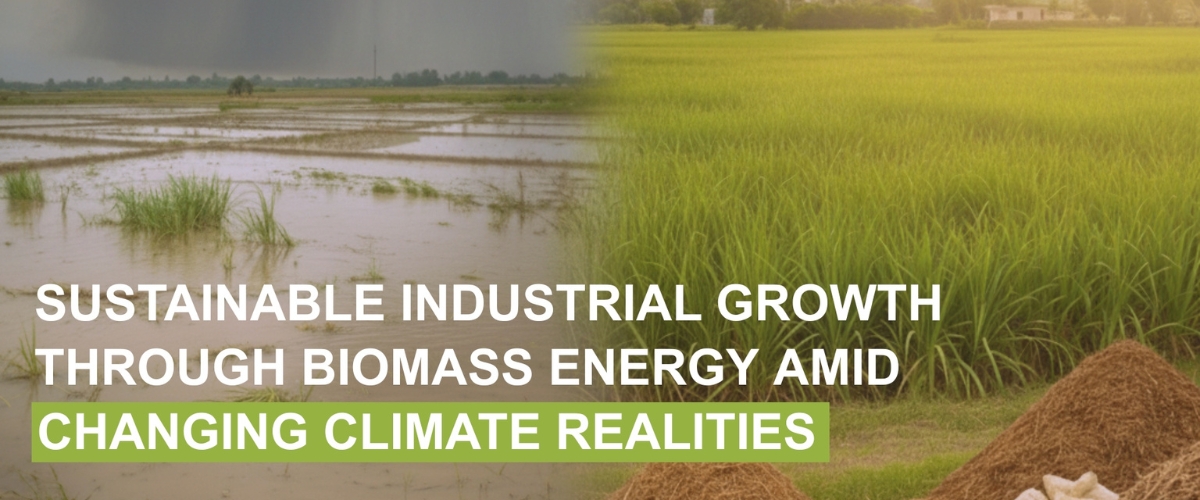Pakistan’s industrial and agricultural sectors are facing a new era of uncertainty as climate change intensifies. The recent floods across Punjab and Sindh have inundated vast agricultural lands, devastating crops such as rice, sugarcane, maize, and cotton. These events have disrupted rural livelihoods and exposed vulnerabilities in the country’s food and energy security. As climate volatility becomes the new normal, industries must seek resilient, sustainable energy solutions. Biomass energy, deeply rooted in Pakistan’s agricultural strength, emerges as both a challenge and an opportunity in these turbulent times.
The Promise of Biomass in Pakistan’s Energy Landscape
Pakistan’s agricultural sector is the backbone of its economy, contributing about 24% to GDP and employing nearly half the labor force. This vast agro-industrial base generates millions of tons of crop residues every year rice husk, corn cobs, sugarcane bagasse, poultry litter, straw, and wood waste that are often treated as waste. Biomass energy solutions transform these byproducts into valuable, renewable fuel for industry, turning a disposal problem into a revenue stream for farmers and a reliable energy source for manufacturers.
The country’s biomass potential is immense. According to World Bank estimates, Pakistan’s total biomass energy could contribute up to 36% of the national energy mix. Biomass is not only abundant but also environmentally friendly, recycling carbon dioxide through photosynthesis and offering a cleaner alternative to fossil fuels. Modern biomass boilers, such as those deployed in sugar and rice mills, efficiently utilize bagasse and husk, reducing waste management costs and creating new income opportunities for rural communities.
The Immediate Challenge: Climate-Driven Flooding and Biomass Fuel Supply
The 2025 monsoon floods have caused significant, though temporary, disruption to the supply of agricultural residues. Over 220,000 hectares of rice fields were submerged, and losses in maize, sugarcane, and livestock have been reported. This has led to a short-term dip in the availability of key biomass fuels like husk and straw. However, it is important to recognize that such disruptions are seasonal setbacks, not systemic flaws. Historically, Pakistan’s agricultural sector has demonstrated resilience, with crop recovery beginning as floodwaters recede and replanting efforts commence. The country’s strong agricultural backbone ensures that biomass fuel supplies will rebound, supporting both energy needs and rural incomes.
Fuel Diversity as a Resilience Factor
One of the greatest strengths of biomass energy is its diversity. Industries are not limited to a single fuel source; they can flexibly adapt between:
- Sugarcane Bagasse: Abundant during the crushing season, especially in sugar mills.
- Poultry Waste: Continuous supply from the livestock sector.
- Wood Waste and Pellets: Sourced from timber and furniture industries.
- Rice Husk, Corn Cobs, Straw: Byproducts from major crops.
This fuel diversity acts as a buffer, protecting industries from over-reliance on any one crop or region. When floods impact one supply chain, others can fill the gap, ensuring continuous industrial operations and energy security. The ability to switch between different biomass fuels is a key factor in building industrial resilience against climate-driven disruptions.
The Positives Beyond the Floods
As floodwaters recede and crops are replanted, the supply of biomass residues will return often stronger than before. Farmers benefit by monetizing what was once considered waste, creating new rural income streams and supporting local economies. Biomass energy also aligns with circular economy principles, reducing landfill use and curbing the harmful practice of open-field burning, which contributes to air pollution and greenhouse gas emissions. By integrating biomass into their energy mix, industries not only reduce their carbon footprint but also contribute to a cleaner, more sustainable environment.
Moreover, the expansion of biomass energy supports rural development by creating jobs in feedstock collection, plant operation, and maintenance. It also provides decentralized energy solutions for off-grid communities, improving quality of life and supporting local economies.
The Strategic Role of ENCOM
With over 20 years of experience and partnerships with global technology leaders, ENCOM is uniquely positioned to guide Pakistani industries through these challenges. ENCOM specializes in the design and deployment of flexible biomass boiler systems capable of switching between different fuels as supply conditions change. Their OEM-certified teams provide comprehensive after-sales support and maintenance, ensuring reliability even during supply disruptions. From turnkey project execution to ongoing technical support, ENCOM stands as a knowledge leader, helping clients pivot toward greener, more resilient energy solutions.
ENCOM’s approach is holistic: from pre-sales consultation and system design to installation, commissioning, and ongoing maintenance. This full-service model ensures that clients receive not just equipment, but a complete solution tailored to their operational needs and local fuel availability.
Looking Ahead: Converting a Short-Term Issue into Long-Term Growth
While climate-driven disruptions like floods are inevitable, the adaptability of biomass energy offers a path to long-term sustainability. As crops and their residues recover, industries that invest in biomass solutions today will enjoy greater energy security, cost savings, and environmental compliance tomorrow. The current challenges are temporary; the benefits of a diversified, renewable energy portfolio are enduring.
Pakistan’s government, through initiatives like the Alternative Energy Development Board (AEDB) and World Bank-supported biomass mapping projects, is actively promoting the expansion of renewable energy, including biomass. These efforts are crucial for closing the electricity supply-demand gap, which has reached up to 5,500 MW in recent years. By leveraging its agricultural strengths and investing in modern biomass technologies, Pakistan can build a more resilient and sustainable energy future.
Conclusion: A Call to Resilient Action
Biomass fuels remain among Pakistan’s most valuable and accessible renewable resources. Short-term climate disruptions should not deter industries from adopting these solutions. True resilience comes from flexibility, foresight, and partnership. ENCOM is ready to support Pakistan’s industries in building a future that is not only energy-secure but also sustainable and climate-resilient.

